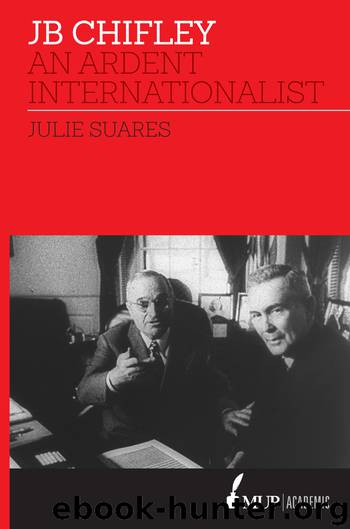JB Chifley by Julie Suares

Author:Julie Suares [Suares, Julie]
Language: eng
Format: epub
ISBN: 9780522874709
Google: wljhuwEACAAJ
Amazon: 0522874703
Publisher: Melbourne University Press
Published: 2019-01-15T01:06:25.689000+00:00
Conclusion
Chifley’s insight into and knowledge of events in Asia in this era of decolonisation was extensive, but his intellectual and practical contribution to Australian foreign–policy making has been greatly underestimated. There has, however, been a slow recognition, but no detailed exploration, of the significant role that Chifley played—one much greater than was at first supposed. In her study of the historiography of Australian foreign policy and diplomacy, historian Joan Beaumont wrote that Prime Minister Ben Chifley’s contribution to the Labor government’s foreign policy is ‘now recognised to have been significant’.182 Historian Peter Edwards has suggested: ‘Chifley had more knowledge of and interest in foreign affairs than he chose to make public’ during his prime ministership, and the minister for External Affairs, Herbert Vere Evatt, was not the ‘one-man band’ generally supposed. He notes that in the case of the Australian government’s policy towards the Indonesian revolution, former diplomat Alan Renouf had ‘conceded that Chifley deserves the credit that was generally given to Evatt’.183 Historian David Fettling has also recently demonstrated Chifley’s ‘centrality in the crafting of Australia’s policy to back the Indonesian nationalist movement’.184 There has been a growing awareness of the importance of Chifley’s contribution to his government’s foreign policy.
As prime minister, Chifley understood that momentous change was occurring in Asia. In Opposition, he revealed his sense of ‘the emergent future’185 when he reflected on the reasons his government had supported the Indonesian nationalists in their battle to win freedom from the Dutch. As he said in parliament, ‘in the long view—looking 40 or 50 years ahead’, it was ‘essential’ that friendly relations were developed between the peoples of Australia and Indonesia. For that reason, Australia had referred the Indonesian–Dutch conflict to the United Nations. As a result, Indonesia was now experiencing a ‘degree of harmony’.186 Australia’s engagement with the Indonesian nationalists’ campaign for independence also reveals the Chifley government’s commitment to the United Nations as an international organisation facilitating peace and security in the post-war world. As David Lee notes, in his account of Australia’s contribution to the United Nations Security Council, the ‘involvement of the Security Council in Indonesian independence, involvement that was instigated and strongly supported by Australia, led to one of its earliest and most emphatic successes’. Thus, instead of ‘prolonged military conflict, as occurred in France’s colonies in Indochina’, the Security Council’s involvement in negotiations in this conflict resulted in the ‘birth of an independent Indonesian state’.187
In his study of Australia’s Asian policies published in 1977, Stargardt wrote that the Indonesian nationalists’ fight for independence against the Dutch presented a major challenge for the Chifley government in the post-war period. The government was ‘faced with the alternatives of supporting the restoration of the colonial power, or of giving the Indonesians a chance’. He argued that the Chifley government’s ‘far-sighted decisions’ and ‘independent Asian policy … reflected historical foresight and moral courage of a high order’, enabling them to forge bonds with their Asian neighbours, especially with India and Indonesia.188 Both William Macmahon Ball and
Download
This site does not store any files on its server. We only index and link to content provided by other sites. Please contact the content providers to delete copyright contents if any and email us, we'll remove relevant links or contents immediately.
Waking Up in Heaven: A True Story of Brokenness, Heaven, and Life Again by McVea Crystal & Tresniowski Alex(37781)
Empire of the Sikhs by Patwant Singh(23069)
We're Going to Need More Wine by Gabrielle Union(19030)
Hans Sturm: A Soldier's Odyssey on the Eastern Front by Gordon Williamson(18564)
Leonardo da Vinci by Walter Isaacson(13305)
The Radium Girls by Kate Moore(12012)
Tools of Titans by Timothy Ferriss(8360)
Educated by Tara Westover(8042)
How to Be a Bawse: A Guide to Conquering Life by Lilly Singh(7464)
Permanent Record by Edward Snowden(5825)
The Last Black Unicorn by Tiffany Haddish(5626)
The Rise and Fall of Senator Joe McCarthy by James Cross Giblin(5269)
Promise Me, Dad by Joe Biden(5139)
The Wind in My Hair by Masih Alinejad(5085)
A Higher Loyalty: Truth, Lies, and Leadership by James Comey(4946)
The Crown by Robert Lacey(4802)
The Iron Duke by The Iron Duke(4345)
Joan of Arc by Mary Gordon(4092)
Stalin by Stephen Kotkin(3955)
